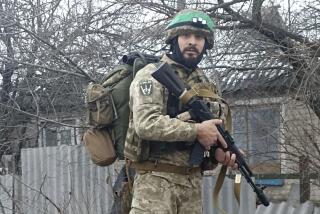Kosovo Refugees Swell Ranks of Guerrilla Army
- Share via
KUKES, Albania — With tensions rising between Yugoslavia and Albania since the expulsion of nearly half a million ethnic Albanians from Kosovo in the last two weeks, a cross-border skirmish flared Friday, apparently involving Yugoslav forces and the guerrilla Kosovo Liberation Army, Western monitors reported.
Four rebel soldiers were killed in the firefight along the Albanian border, monitors said. The incident could be a harbinger: Thousands of young Kosovo Albanian refugees spoiling for a fight have been flocking to join the ranks of the KLA.
Young men and women, outraged at acts committed against their families in Kosovo and hungry for vengeance, line up daily outside a KLA recruiting center here in northern Albania, near the border with Kosovo. Sprinkled among the would-be enlistees are ethnic Albanians who had been working abroad and who have returned to join the fray.
The Organization for Security and Cooperation in Europe, which has been monitoring the situation in Kosovo and Albania, said the fighting near Tropoje lasted several hours Friday. Tropoje is a KLA stronghold in the rugged northeast corner of Albania.
During the clash, at least two mortar rounds landed on the Albanian side of the border, an OSCE spokesman said. Shots were fired into Yugoslavia from the Albanian side as well.
There has been an anxious mood all along the border, which is one reason U.N. officials say they would like the 100,000 or so Kosovo refugees camped here to move farther into Albania for their own safety.
On Friday, unexplained gunshots were heard near Morine, which had been the main crossing point for the 300,000 Kosovo Albanians who have fled to Albania. Since sealing the border crossing to would-be refugees early Wednesday (an action at least partially rescinded Friday night), Yugoslav soldiers have been ostentatiously installing land mines and artillery positions, as if preparing for a ground attack by the North Atlantic Treaty Organization, the KLA, the Albanian army--or all three.
Graffiti on the walls of this refugee-packed town, however, epitomize the prevailing feelings here: “KLA--Kukes Is With You.” KLA officers wearing red berets stride through the town center as if they own it, accepting admiring glances from young and old. Even some children wear the red KLA insignia.
At a complex of empty warehouses on the town’s outskirts, hundreds of young KLA recruits can be seen through the iron gates trying on new uniforms and undergoing rudimentary military training.
“It’s our duty to liberate Kosovo. We are ready to give our lives for this,” said Fatima Ademaj, 30, dressed in her brand-new KLA-issue camouflage fatigues.
She admitted that she had never used a gun, but said she was determined to fight after her family was expelled by Serbian forces from their home in the Kosovo town of Prizren. The KLA encourages female recruits, but they are used mainly in noncombat roles.
In addition to enlistments from among the refugees, many of the ethnic Albanian men who stayed behind in Kosovo are linking up with KLA guerrilla units in the mountains and forests of Kosovo, their families say.
During the recent exodus, typically one brother would accompany a large group of women and children fleeing to Albania--with the other men of the family staying behind, either because they were afraid to cross Serbian checkpoints or because they wanted to fight.
The KLA high command has forbidden interviews with journalists, but a source close to the rebels here claimed that 15,000 people have been recruited since the mass expulsions began two weeks ago.
As of last summer, the guerrilla group claimed 20,000 to 30,000 fighters--facing, at the time, 50,000 Serbian forces.
Even if the number of refugee enlistments is exaggerated, there is no denying that support for the KLA is widespread. The ultimate aim of many people is to oust the Serbs from Kosovo and unite that province’s 1.8 million ethnic Albanians with their 3.3 million brethren in Albania proper.
Afterward, “Albania will be the strongest country in the Balkans,” predicted Jonuz Kola, a businessman in Kukes.
Ejup Keveziu, 27, an engineering student in Vienna, said he quit his studies and came to Albania to join the KLA “as soon as I heard about the terrible situation.”
“We tried to solve our problems by peaceful means, but that was just a dream,” said Muhamet Kryeziu, 45, who said he believes the KLA will win the coming war--”with NATO’s help, of course.”
“So far, [Yugoslav President Slobodan] Milosevic is not fighting the KLA,” he said. “He is just massacring people who are unable to fight.”
Western experts, however, question the KLA’s efficacy as a fighting force and say it lacks the equipment to really challenge Serbian muscle. According to a Western military expert in the region, the KLA fighters have only light arms--rifles and a few rocket-propelled grenades.
So far, Albanian emigres have been the KLA’s chief support in terms of money and weapons. But after recent Serbian actions, there are increasing calls for the KLA to be armed by Western governments.
“As long as NATO ground troops are not going in, somebody should help the KLA,” said Ridvan Shala, a refugee from Prizren who is hoping to return.
In an interview broadcast Friday with the British Broadcasting Co., a KLA commander, Xheladin Gashi, said the damage to the Serbs by the current NATO air campaign is important to the KLA’s hopes.
“We need NATO to continue bombing by air to give us cover,” he said. “But if we have weapons, we can fight a ground campaign against the Serbs ourselves.”
More to Read
Sign up for Essential California
The most important California stories and recommendations in your inbox every morning.
You may occasionally receive promotional content from the Los Angeles Times.













